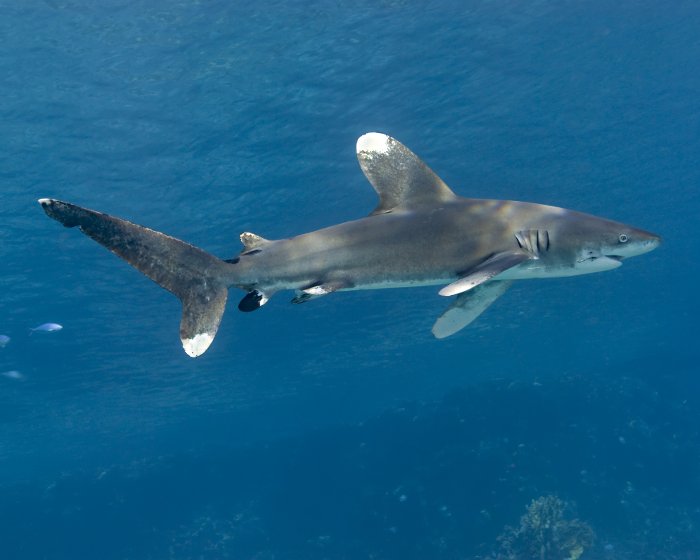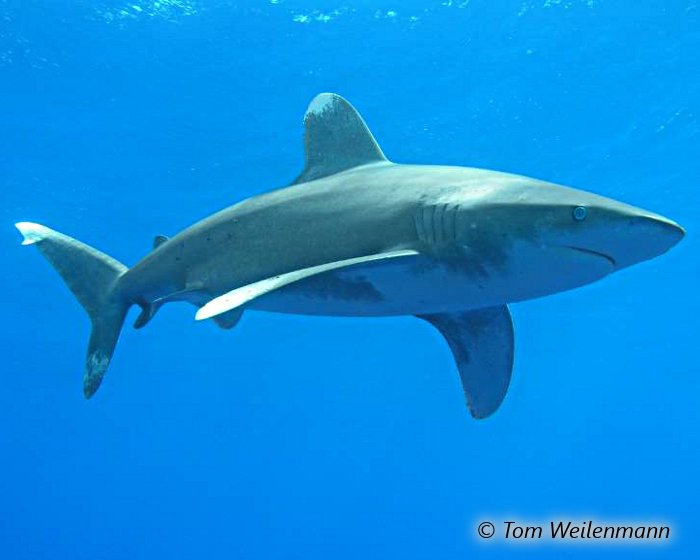Sealife guideThe oceanic whitetip sharkCarcharhinus longimanus
Last updated on 09/09/2024 at 12:39 PM
Taxonomy
- Common name: Oceanic whitetip shark
- French name: Requin pointe blanche océanique, requin longimanus, requin pointe blanche du large, requin océanique à aileron blanc, aileron du large, requin longimane
- Spanish name: Tiburón oceánico
- Scientific name: Carcharhinus longimanus (Poey, 1861)
- Family name: Carcharhinidae
- Order name: Carcharhiniformes
- Class name: Elasmobranchii
Description
The oceanic whitetip shark, also known simply as longimanus, named after its scientific designation, is a pelagic shark averaging about 9 feet in length. Its maximum size can reach 13 feet and it can weigh up to 370 pounds.
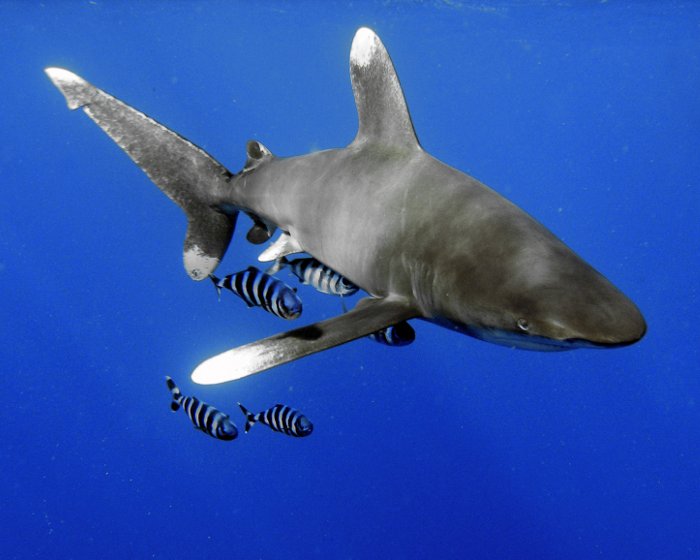
The oceanic whitetip shark surrounded by its loyal entourage of pilot fish !
The oceanic whitetip is distinguished by its large, rounded first dorsal fin and its prominent pectoral fins with whitish tips.
Its body is robust, elongated and dark gray with a bronze tint while its belly is white.
Geographic range
The oceanic whitetip shark is widely distributed in tropical and subtropical waters around the globe. In the eastern Pacific ocean, it can be found from southern California to Peru, including the Galapagos islands.
In Egypt, it is commonly seen in the southern Red sea.
Habitat
The oceanic whitetip shark can be found from the surface down to depths of over 650 feet but typically stays within 490 feet. It is a pelagic shark that generally lives alone in open water escorted by pilot fish.
Diet
Its diet consists mainly of pelagic fish like tuna and jacks, but it also preys on rays, mollusks and sea turtles.
Reproduction
The oceanic whitetip shark is viviparous. After a one-year gestation, up to 15 pups are born, each about 2 feet long. They reach sexual maturity at about 6 feet for males and 6.5 feet for females.
Did you know ?
Often, the oceanic whitetip shark is accompanied by its loyal entourage of pilot fish.
The oldest recorded oceanic whitetip shark was 22 years old.
The oceanic whitetip shark is listed as many other marine species within The IUCN Red List of threatened species. The oceanic whitetip shark appears in the IUCN Red List since 2019 within the category Critically Endangered !
Tips for observing
Active both day and night, the oceanic whitetip shark is bold and curious, often approaching divers with persistence. Keep an eye out, stay calm and be cautious if encountered !
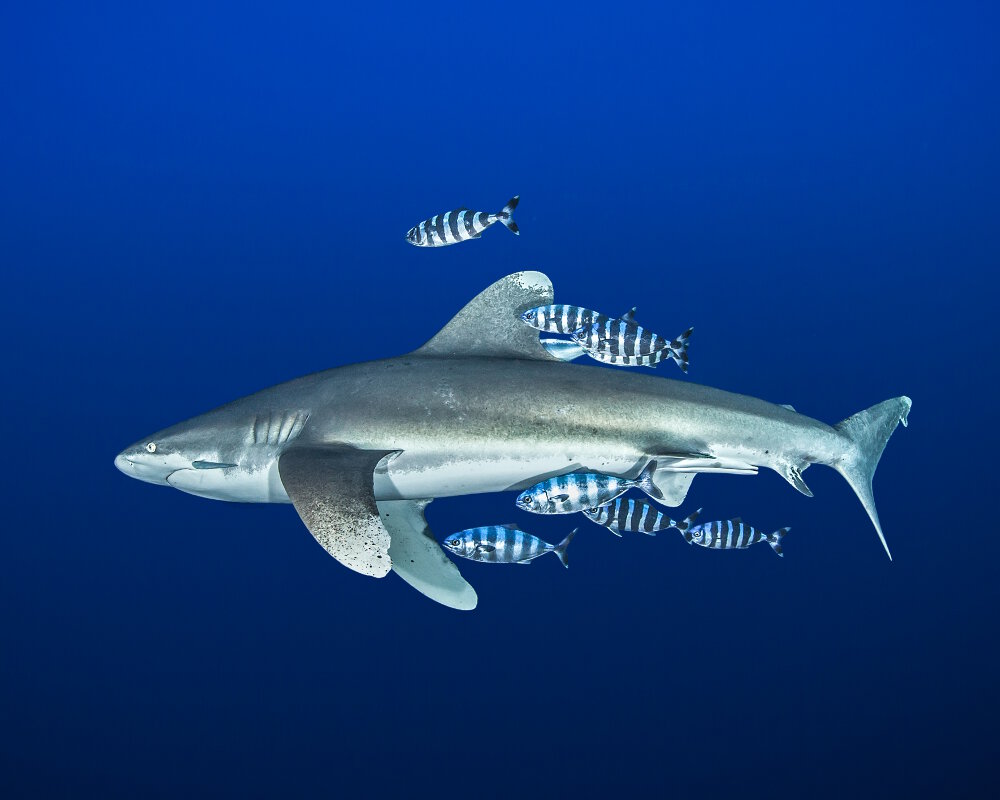
An oceanic whitetip shark escorted by pilot fish © Berndneeser | Dreamstime.com
Within the same genus
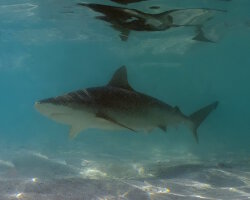
Blacknose shark
(Carcharhinus acronotus)
(Carcharhinus acronotus)
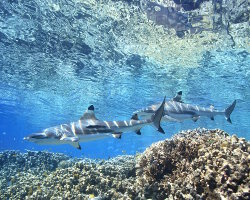
Blacktip reef shark
(Carcharhinus melanopterus)
(Carcharhinus melanopterus)
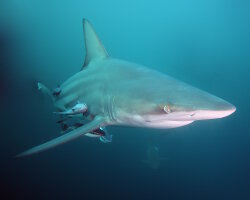
Blacktip shark
(Carcharhinus limbatus)
(Carcharhinus limbatus)
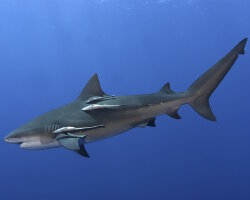
Bull shark
(Carcharhinus leucas)
(Carcharhinus leucas)
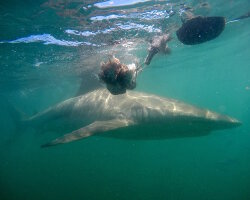
Copper shark
(Carcharhinus brachyurus)
(Carcharhinus brachyurus)
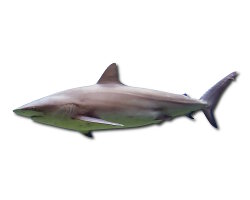
Dusky shark
(Carcharhinus obscurus)
(Carcharhinus obscurus)
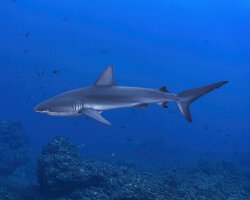
Galapagos shark
(Carcharhinus galapagensis)
(Carcharhinus galapagensis)
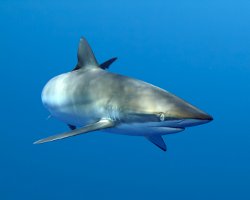
Silky Shark
(Carcharhinus falciformis)
(Carcharhinus falciformis)
Within the same family
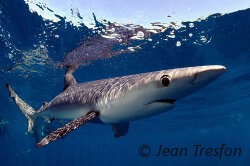
Blue shark
(Prionace glauca)
(Prionace glauca)
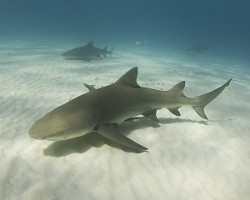
Lemon shark
(Negaprion brevirostris)
(Negaprion brevirostris)
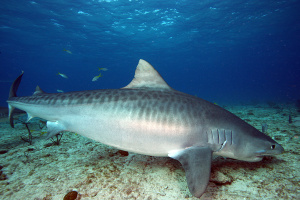
Tiger shark
(Galeocerdo cuvier)
(Galeocerdo cuvier)
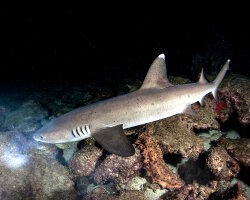
Whitetip reef shark
(Triaenodon obesus)
(Triaenodon obesus)
Discover also
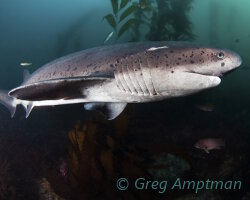
Broadnose sevengill shark
(Notorynchus cepedianus)
(Notorynchus cepedianus)
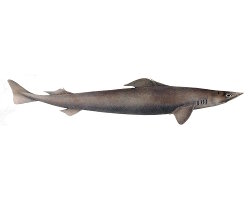
Leafscale gulper shark
(Centrophorus squamosus)
(Centrophorus squamosus)
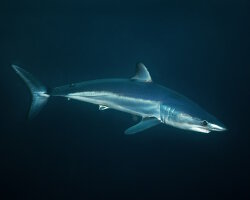
Longfin mako
(Isurus paucus)
(Isurus paucus)
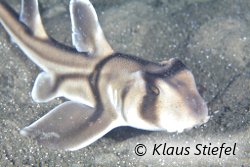
Port Jackson shark
(Heterodontus portusjacksoni)
(Heterodontus portusjacksoni)
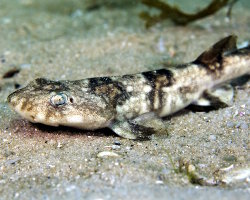
Puffadder shyshark
(Haploblepharus edwardsii)
(Haploblepharus edwardsii)
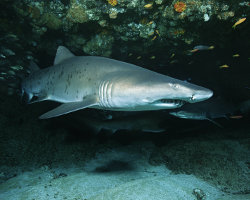
Sand tiger shark
(Carcharias taurus)
(Carcharias taurus)
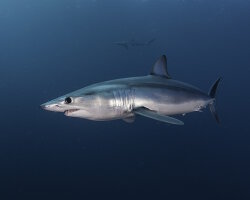
Short fin mako
(Isurus oxyrinchus)
(Isurus oxyrinchus)
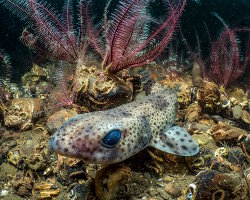
Small-spotted catshark
(Scyliorhinus canicula)
(Scyliorhinus canicula)
Our latestUpdates
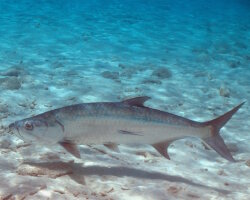
Wednesday, February 18th 2026
The Atlantic tarpon
The Atlantic tarpon is a large coastal fish that can grow up to 8 feet long and weigh over 330 pounds, with a silvery body covered in large, reflective scales. Known as the Silver King, it is famous for its spectacular leaps and fierce fight when hooked by sport fishermen.
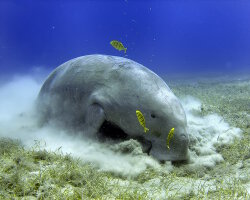
Friday, January 30th 2026
The dugong
Discover the dugong, a gentle “sea cow” of tropical waters. Learn about its habitat, diet, reproduction, morphology, and the threats facing this unique marine mammal.
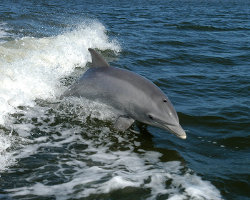
Friday, January 23rd 2026
Dolphins: ocean's smartest creatures
Discover dolphins, the ocean's geniuses: explore their intelligence, social behavior, sophisticated communication, species diversity and vital role in marine ecosystems.
Photo of the Day
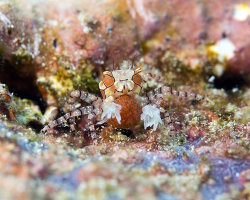
Crabe boxeur à mosaïque
(Lybia tessellata)
(Lybia tessellata)

